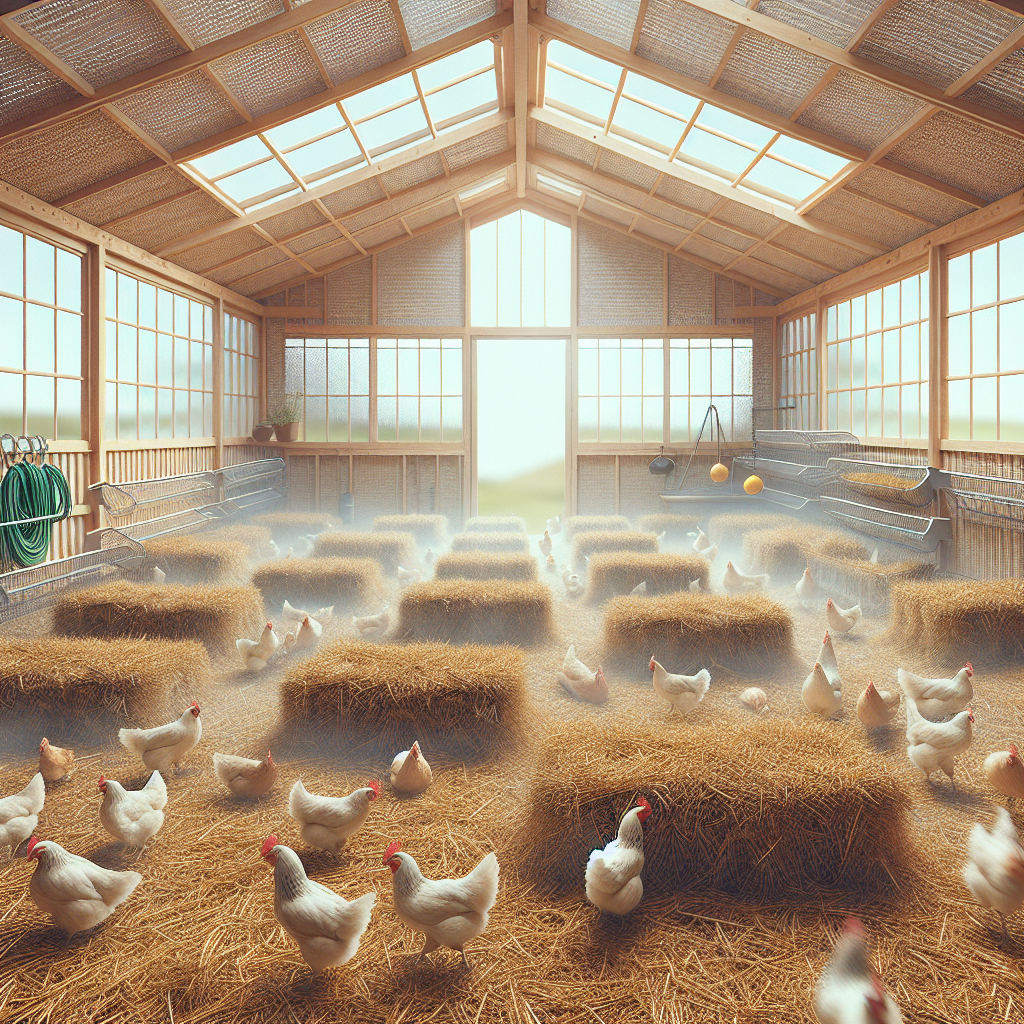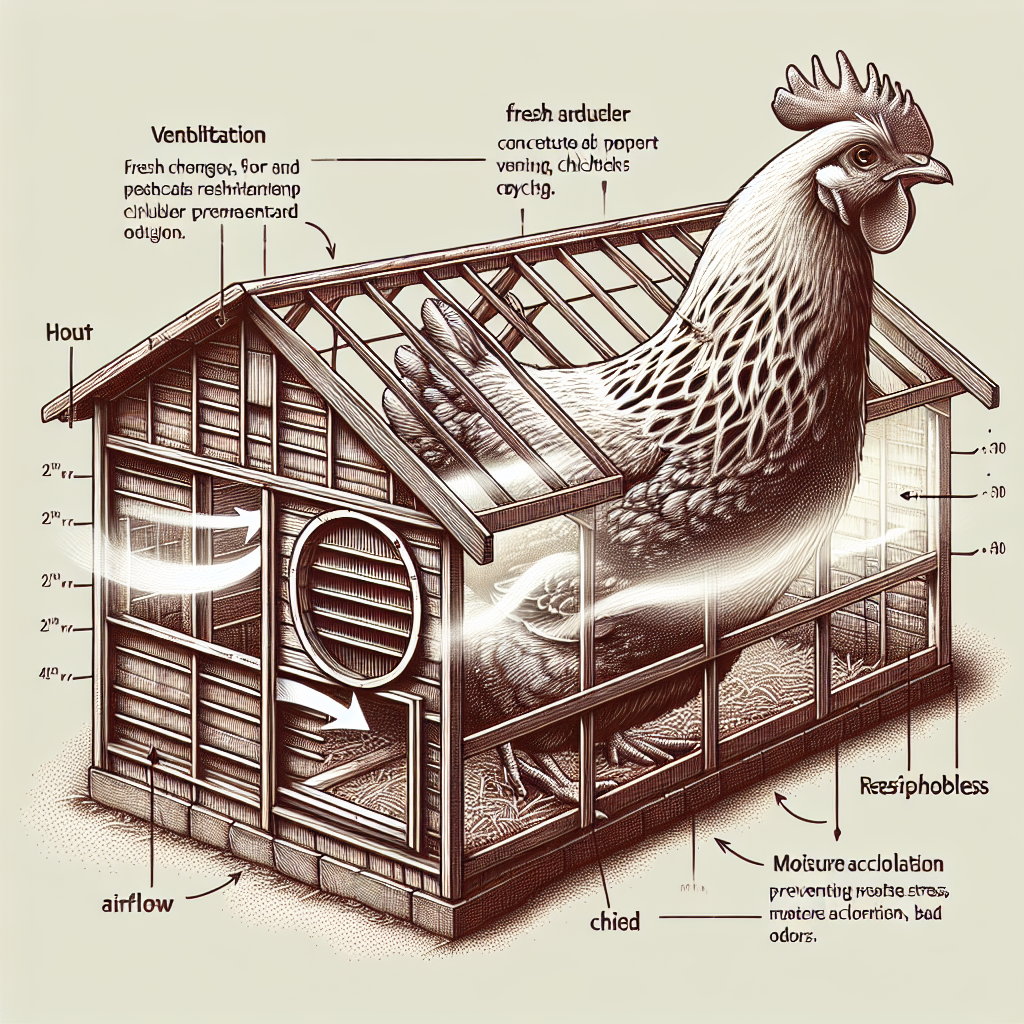Maintaining a clean and sanitary coop is crucial for preventing health issues among your flock. In this article, we will explore some practical tips and guidelines to ensure optimal hygiene in your chicken coop. From regular cleaning routines to the proper disposal of waste, you’ll discover valuable insights on how to create a healthy living environment for your beloved chickens. Whether you are a seasoned poultry keeper or a beginner, these simple yet effective measures will help you safeguard the well-being of your feathered friends.
Preventative Measures for a Healthy Coop
Regular Cleaning and Disinfecting
To maintain a healthy coop, regular cleaning and disinfecting are essential. As a responsible chicken owner, you should establish a cleaning routine to remove dirt, droppings, and any potential bacteria or viruses. Start by removing all bedding materials, including soiled straw or wood shavings. Use a shovel or rake to clear out any accumulated debris, ensuring you reach every nook and cranny of the coop. Afterward, thoroughly clean the surfaces with a mild detergent or coop cleaner, ensuring you scrub away any stubborn stains or dirt. Once the coop is clean, make sure to disinfect it using a suitable disinfectant approved for poultry coops. This will help kill any remaining pathogens and minimize the risk of disease transmission.
Proper Waste Management
Effective waste management is crucial to maintaining a healthy coop environment. Chicken droppings can contain harmful bacteria and parasites, so it’s important to properly manage and dispose of them. Consider using a deep litter method, where you periodically add fresh bedding material on top of the existing bedding. This promotes composting and helps to control odors. Regularly turning and aerating the litter will assist in breaking down the manure and preventing the buildup of harmful ammonia fumes. Additionally, ensure that your coop has a well-designed drainage system to prevent flooding and waterlogging, as excess moisture can lead to bacterial growth and other health issues.
Maintaining Good Ventilation
Proper ventilation is vital for a healthy coop environment. Good ventilation helps to control excess moisture, ammonia, and other airborne contaminants. To ensure adequate airflow, your coop should have well-placed windows, vents, or gable openings. This allows for the exchange of fresh air while minimizing drafts. It’s essential to strike a balance between ventilation and insulation to keep your chickens comfortable and maintain good air quality. Regularly check that the ventilation openings are not blocked by obstructions such as bedding or debris.
Controlling Pests and Parasites
Pests and parasites can wreak havoc on your chickens’ health and the overall cleanliness of the coop. Implementing an effective pest control strategy is crucial in preventing infestations. Regularly inspect your coop for signs of pests such as mites, lice, or rodents. There are several measures you can take to control pests, such as using poultry-friendly insecticides, installing predator-proof fencing, and sealing any cracks or holes that may serve as entry points. Additionally, practicing good coop hygiene, like promptly removing fallen feathers or spilled feed, can help deter pests. Consider using natural deterrents like diatomaceous earth and herbs known for their pest-repelling properties.
Health Monitoring and Early Detection
Observing Chicken Behavior
Being attentive to your chickens’ behavior can provide valuable insights into their health. Spend time observing their activities and interactions daily. Healthy chickens are typically active, alert, and have a good appetite. If you notice any changes in behavior, such as lethargy, reduced appetite, or feather ruffling, it may indicate an underlying health issue. Regularly interact with your flock to establish a baseline of their normal behavior, making it easier to recognize deviations and seek appropriate veterinary care.
Checking for Signs of Illness
Regular health checks are essential for early detection of any potential illnesses. Inspect your chickens regularly for signs of illness, such as abnormal droppings, discharge from the eyes or nostrils, or any visible wounds or injuries. Pay close attention to their overall appearance, including their feathers and skin condition. Palpate their abdomen gently to check for any noticeable abnormalities. By conducting frequent and thorough examinations, you can promptly address any health concerns before they escalate.
Regular Veterinary Visits
Establishing a relationship with a poultry veterinarian is advantageous for maintaining the health of your flock. Regular veterinary check-ups can help identify and prevent potential health issues. Make it a priority to schedule routine visits with your veterinarian. They can provide vaccinations, conduct fecal exams to check for parasites, and offer guidance on nutrition and flock management. In the event of an outbreak or illness, your veterinarian will be equipped to provide the necessary treatment and advice for optimal flock health.
Maintaining Clean Bedding and Nesting Areas
Choosing the Right Bedding
Selecting appropriate bedding materials is crucial for maintaining clean and healthy nesting areas. Consider using materials like straw, wood shavings, or hemp bedding, which provide good absorbency and ventilation. Avoid using materials that retain moisture, such as hay, as they can promote bacterial growth and cause respiratory issues. Choose bedding that is easy to clean and replace, promoting good hygiene practices within the coop.
Regularly Cleaning and Replacing Bedding
Cleaning and replacing bedding on a regular basis is key to preventing the buildup of harmful bacteria and maintaining good hygiene. Remove soiled bedding and droppings regularly, replacing them with fresh, clean material. The frequency of cleaning and bedding replacement will depend on the size of your flock and the coop’s overall cleanliness. As a general guideline, aim to clean and replace bedding at least once a week, or more frequently if necessary. This will help reduce the risk of disease transmission and provide a comfortable environment for your chickens.
Monitoring Nesting Areas for Parasites
Nesting areas are particularly prone to parasitic infestations, such as mites or lice. Conduct regular inspections of the nesting boxes to detect any signs of parasites. Look for tiny moving specks or clusters of eggs on the chickens or within the nesting material. If you discover any infestations, promptly treat the affected chickens and clean and disinfect the nesting boxes. Consider using natural remedies or approved insecticides to eliminate the pests and prevent future infestations.
Water and Feed Maintenance
Providing Clean and Fresh Water Daily
Water is an essential element for maintaining a healthy flock. Ensure that your chickens have access to clean and fresh water at all times. Regularly inspect water containers, ensuring they are free from algae, debris, or any signs of contamination. Clean and refill the water containers daily to prevent the growth of harmful bacteria and provide your chickens with a steady supply of hydration.
Ensuring Proper Storage of Feed
Proper storage of feed plays a significant role in maintaining its nutritional value and preventing contamination. Opt for airtight containers or bins with lids to keep the feed dry and protected from pests. Store feed in a cool, dry area such as a dedicated feed room or sealed containers within the coop. Regularly inspect and discard any feed that appears moldy or has an off smell. By practicing good feed storage habits, you can ensure your chickens receive high-quality feed and reduce the risk of feed-related health issues.
Preventing Water and Feed Contamination
Contamination of water and feed can lead to a variety of health problems for your flock. Ensure that water and feed containers are placed at an appropriate height, minimizing the risk of droppings or debris falling into them. Keep feed away from areas where wild birds or rodents may access it, as they can introduce contaminants. Regularly sanitize water and feed containers with mild detergents or approved cleaners. Paying attention to water and feed hygiene will help prevent the spread of diseases and promote the overall health of your chickens.
Maintaining a Coop Biosecurity Plan
Limiting Visitors and Quarantining New Birds
Implementing biosecurity measures is vital in preventing the introduction and spread of diseases within your flock. Limiting visitors to your coop helps reduce the risk of disease transmission. When introducing new birds into the flock, quarantine them in a separate area for a designated period. This allows you to observe them for any signs of illness or infection before introducing them to your established flock. These measures can significantly reduce the chances of introducing diseases into your flock and help maintain a healthy coop environment.
Using Footbaths and Protective Clothing
Footbaths and protective clothing are effective tools in preventing the spread of diseases into and out of the coop. Set up footbaths filled with disinfectant at the entrance of the coop. This ensures that anyone entering or exiting the coop cleanses their footwear, reducing the chance of carrying contaminants. Additionally, consider wearing dedicated clothing or protective gear when tending to your chickens. This prevents the transfer of pathogens from outside sources and minimizes the risk of transmitting diseases to your flock.
Practicing Good Hygiene
Maintaining good hygiene practices is essential for overall coop health. Wash your hands thoroughly with soap and water before and after handling your chickens or entering the coop. Dispose of disposable gloves properly after use and avoid cross-contamination between different areas of the coop. Regularly clean and disinfect any equipment used within the coop, such as feeders, waterers, or tools. By prioritizing hygiene, you can minimize the risk of disease transmission and promote a healthy coop environment.
Promoting Chicken Exercise and Health
Providing Adequate Space for Exercise
Adequate space for exercise is crucial to promote chicken health and well-being. Allow your chickens to roam freely in a spacious outdoor area if possible, as it encourages natural behaviors and exercise. Even in a confined coop, provide perches and platforms for chickens to jump and stretch their wings. Consider utilizing chicken-friendly toys or obstacles to stimulate activity. By providing ample space for exercise, you ensure that your chickens lead a physically active and healthy lifestyle.
Encouraging Natural Foraging and Dust Bathing
Encouraging natural foraging and dust bathing is a great way to promote chicken health and happiness. Allow your flock access to areas with grass, dirt, or sand where they can peck at the ground, searching for insects and other edible treats. Providing shallow areas filled with dirt or sand also allows chickens to engage in dust bathing behavior. Dust bathing helps to control parasites and keeps their feathers clean. By enabling natural foraging and dust bathing activities, you contribute to their overall well-being and satisfaction.
Regular Physical Check-ups
Similar to humans, chickens benefit from regular physical check-ups. Schedule periodic health assessments with your veterinarian to ensure your chickens are in optimal condition. During these check-ups, the veterinarian will assess their overall health, examine their feathers and skin, check vital signs, and perform any necessary diagnostic tests. By conducting regular physical check-ups, you can identify any potential health issues early on and implement appropriate interventions for the well-being of your flock.
Managing Manure and Odor Control
Implementing Proper Manure Management Practices
Proper management of manure is crucial to prevent odor issues and maintain a clean and healthy coop environment. Regularly remove manure from the coop and dispose of it properly in a dedicated compost bin or spread it as fertilizer in designated areas away from the coop. Composting the manure helps break it down, reducing odor and creating a valuable soil amendment. Remember to turn the compost regularly to ensure efficient decomposition. By effectively managing manure, you minimize the risk of odor problems and maintain a more enjoyable coop environment.
Using Composting Techniques
Composting is an effective technique for managing manure while harnessing its nutrient-rich properties. Establish a dedicated compost bin or area where you can deposit the manure, along with other suitable materials like straw or vegetable scraps. Layering the materials and turning the pile frequently hastens the decomposition process. As the compost breaks down, the nutrients become available for later use in your garden or flower beds. Composting not only reduces manure volume and odor but also promotes sustainability and environmental stewardship.
Addressing Odor Issues
Unpleasant odors emanating from the coop can be a nuisance and even indicate underlying issues. To address odor problems, ensure proper ventilation within the coop to promote airflow and prevent the buildup of ammonia fumes. Regularly clean and replace soiled bedding and manure to reduce the source of odors. Consider using odor-absorbing materials like baking soda or activated charcoal in the coop. If odors persist, it’s important to identify and address any potential underlying causes, such as poor drainage or ventilation issues.
Preventing Contamination from Wild Birds
Implementing Bird-Proofing Measures
Wild birds can introduce diseases and parasites to your flock, so it’s crucial to implement bird-proofing measures. Cover any exposed feed or water sources to prevent access by wild birds. Use wire mesh or bird netting to secure openings and prevent wild birds from entering the coop. Regularly inspect the coop for any potential entry points, such as gaps in walls or roofs. By effectively bird-proofing your coop, you reduce the risk of disease transmission from wild birds and help maintain a healthy flock.
Maintaining Bird Feeders Away from the Coop
If you have bird feeders in your backyard, it’s essential to keep them away from the coop area. Bird feeders attract wild birds, increasing the likelihood of disease transmission. Maintaining a distance between the coop and bird feeders minimizes the chance of cross-contamination between wild birds and your flock. Regularly clean and disinfect bird feeders to prevent the buildup of bacteria or parasites. By practicing proper placement and maintenance of bird feeders, you can reduce the risk of disease introduction to your chickens.
Regularly Cleaning and Disinfecting Feeders
Bird feeders can become a source of disease transmission if not properly cleaned and maintained. Regularly clean and disinfect feeders to prevent the growth of harmful bacteria or parasites. Disassemble the feeders and wash all components with hot, soapy water. Use a brush to remove any food or debris stuck in crevices. Rinse thoroughly and sanitize the feeders with a poultry-friendly disinfectant. Once dry, refill the feeders with clean feed. By implementing regular cleaning practices, you can safeguard your flock from potential pathogens carried by wild birds.
Educating Yourself and Seeking Professional Advice
Staying Informed about Chicken Health
Staying informed about chicken health is crucial for successful coop management. Regularly educate yourself on common chicken illnesses, recommended vaccination schedules, and best practices for overall flock care. Stay updated on industry advancements and research findings related to poultry health. By staying informed, you can make informed decisions regarding your flock’s health and well-being.
Joining Poultry Associations or Online Communities
Joining poultry associations or online communities provides an opportunity to connect with fellow chicken enthusiasts and learn from their experiences. These communities often have valuable resources, discussion forums, and expert advice. By participating in these groups, you can expand your knowledge, seek guidance when faced with challenges, and share your own experiences. The collective wisdom and support within these communities can prove invaluable in maintaining a healthy and thriving flock.
Consulting with Veterinarians or Avian Experts
When faced with specific concerns or complex health issues, it is advisable to consult with a veterinarian or avian expert. These professionals have specialized knowledge and experience in poultry health. Reach out to them for guidance on vaccination protocols, disease prevention strategies, or treatment options for specific ailments. Establishing a relationship with a knowledgeable veterinarian or avian expert ensures that you have access to professional advice when needed, helping you provide the best possible care for your chickens.
In conclusion, maintaining a clean and sanitary coop is essential for promoting the health and well-being of your flock. By following preventative measures such as regular cleaning and disinfecting, proper waste management, and good ventilation, you can minimize the risk of disease transmission. Monitoring chicken behavior and conducting regular health checks allows for early detection of any potential illnesses. Proper bedding and nesting area maintenance, along with clean water and feed practices, ensure optimal conditions for your chickens. Implementing a biosecurity plan, promoting exercise, and managing manure and odor help keep your coop healthy and enjoyable. Preventing contamination from wild birds and seeking professional advice further contribute to the overall well-being of your flock. By incorporating these practices into your routine and staying informed, you can create a healthy and thriving environment for your chickens.




